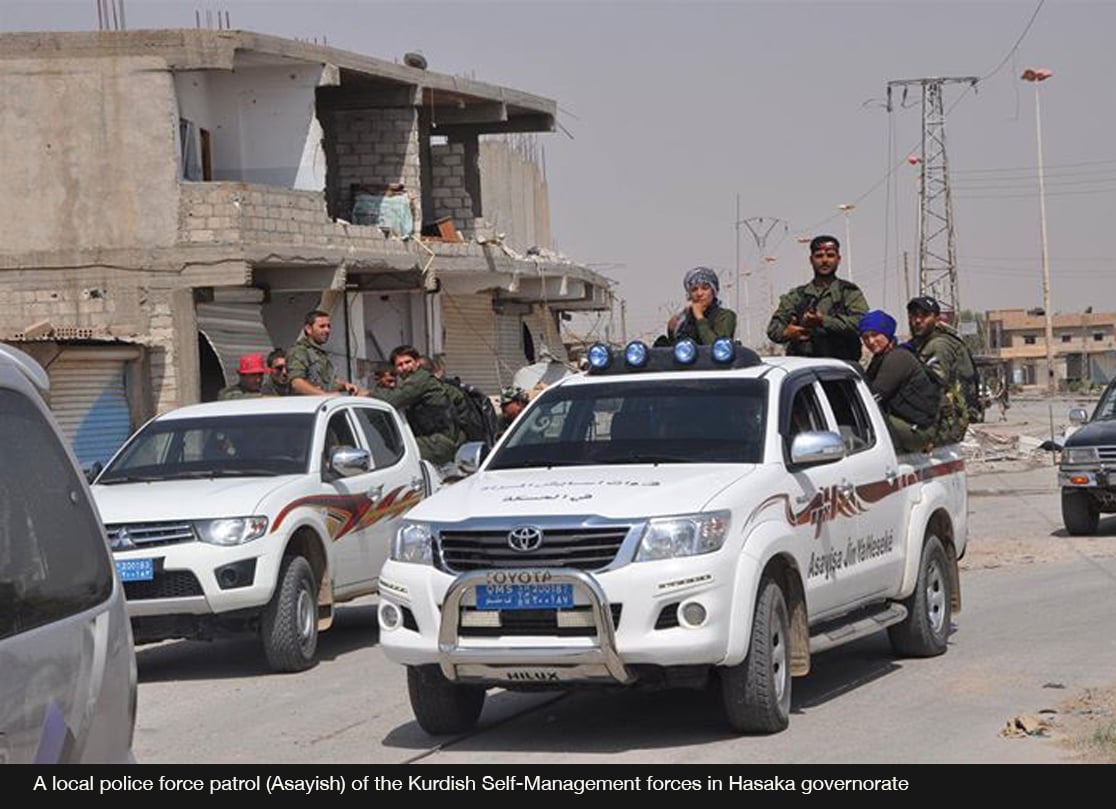
The SNHR announced in its report released today that Kurdish Self-Management forces have escalated the frequency of arrests and enforced disappearances since the beginning of 2019 in light of the intensification of their policy of harassment, repression and violation of basic human rights norms in the territories under their control.
The report says that since the beginning of 2019, Self-Management forces have carried out a number of large-scale raid and arrest campaigns in both Raqqa and Hasaka governorates. Half of the detainees seized in these campaigns can be categorized as forcibly disappeared in light of the Self-Management forces’ denial of their arrest, preventing detainees from contacting their families or retaining a lawyer, and of the detainees’ families being unaware of their whereabouts.
The four-page report cites multiple patterns of violations committed by Kurdish Self-Management; foremost among these is arrest, which often turns into enforced disappearance, as well as torture, conscription of children and forced conscription. The most egregious of these violations was the death of two people due to torture and medical negligence in the Self-Management forces’ detention centers. The Self-Management Forces subsequently returned their victims’ bodies to their families.
The report details the prominent areas in which raids and arrests were carried out such as the cities of Raqqa, Tal Abyad and al Tabaqa, in addition to the villages of al Qahtaniya, Ein al Arous, Mas’ada, Khas Habbal, Khas Dakoul and Khas Aalej, as well as the towns of Slouk and al Mansoura in Raqqa governorate, and both Ein al Arab and Manbej cities in Aleppo governorate, and Hasaka and al Derbasiya cities in Hasaka governorate.
The report documents the arrest of at least 107 individuals, including four children and six women, by Self-Management forces from the beginning of January 2019 until the publication of this report. Fifty-two of these detainees have been forcibly disappeared. According to the report, the arrests carried out by Self-Management forces targeted IDPs residing in areas under their control, mainly the inhabitants of refugee camps, citing various charges such as alleged kinship relationships between the IDPs and members of ISIS, or members of Armed Opposition factions. The report also documents several incidents in which the Self-Management forces arrested many individuals from the same family, and targeted individuals participating in protests against their policies, as well as targeting dignitaries and tribal sheikhs who refused to support their policies, such as the imposition of conscription, or refused to condemn protests against them. The report notes that the arrests also targeted teachers who deviated from the educational curriculum and teaching methods imposed by the Self-Management forces.
The report stresses that most of the arrests and raids were carried out without any judicial warrant, and in other cases, the report documents, operations similar to abductions of civilians from markets and other public places were carried out by Self-Management forces.
The report also notes that some residents who are being persecuted by the Self-Management forces have received threats that their properties will be burnt down and their families arrested if they do not surrender.
In addition to all of the aforementioned, the report documents four conscription incidents of children aged 13-17 during the period covered by this report, all of whom were abducted by the Self-Management forces, who have subsequently refused to give their families any information about their children’s whereabouts or wellbeing except to state that their children have been taken to military training centers.
The report stresses that Kurdish Self-Management forces have repeatedly violated international human rights law in many areas. According to article 7 of the Rome Statute, torture, enforced disappearances and severe deprivation of physical liberty constitute crimes against humanity if they are knowingly and broadly exercised, with the report noting that there is a broad strategic policy employed by Kurdish Self-Management forces.
According to the report, international law provides special protection for children in situations of armed conflict, including a strict prohibition on the conscription of children, and the use of children in hostilities. Also, Kurdish Self-Management forces have repeatedly violated this prohibition by abducting children and taking advantage of their vulnerability and poor living and psychological conditions to force them into military service with their forces.
The report calls on Self-Management forces to respect the principles of international human rights law, to end all forms of arbitrary arrest, to disclose the fate of detainees, to allow them to communicate with their families and to receive a fair trial, to acknowledge the fate of the disappeared, and to stop all forms of torture. In addition, the report calls on the states supporting Syrian Democratic Forces to apply pressure on these forces in order to compel them to cease all of their violations in all the areas and towns under their control and to cease all forms of arms support. The report considers providing the Syrian Democratic Forces with weapons and other military support while knowing that these can be used in perpetrating war crimes or crimes against humanity can be seen as a contribution to these crimes.
Finally, the report stresses the importance of supporting the course of a democratic political process in the areas of eastern Syria, and beginning an electoral process in which all members of society can freely participate under international supervision, leading to a democratic political authority that truly represents society, whose establishment will lead to stability and justice.


